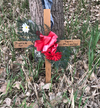The shotgun blast took Terri McCauley’s face off, killing her instantly.
She was found murdered on Sept. 27, 1983, in Sioux City, Iowa and for more than 40 years, her case was cold as a cucumber.
A member of the Omaha Tribe, McCauley, 18, fell under the dark umbrella of murdered and missing Indigenous women and girls (MMIWG). There have been varying estimates of the casualty figures but it’s somewhere between 4,000 and 7,000.
But while Canada has been content to virtue signal and sloganeer just enough to keep the denizens of the Annex, Westmount and the Glebe smug, America has taken action. Adding insult to injury for the woke, the bold initiative was started by President Donald Trump during his first term in office.
Canada’s chattering classes talked, self-flagellated, scolded and offered meaningless tears. In America, they’ve closed cases, made arrests and brought justice, relief and maybe some closure to the families of the dead.

The U.S. formed half a dozen task forces in “Indian Country” to solve the murders and disappearances. Canada? Not so much.
Toronto Police cold case boss Det. Sgt. Steve Smith told the Toronto Sun that it isn’t as if this kind of initiative hadn’t been brought to the current government.
“With TPS, we have the ideal model to serve all of Ontario,” Smith said, adding that for the past three years, the solicitor general has provided funding to tackle 30 unsolved murders, unidentified bodies and historic sex assaults.

“Federally, we asked numerous times for funding to set up a national task force to make the expertise accessible across Canada but there was zero traction.
“We’re hoping to take it up again with a new federal government. So many of the MMIWG cases are easily solvable.”
Smith and TPS have been at the forefront of the revolution in cold-case investigations. Using genetic genealogy, they have closed some of the city’s most vexing homicides: Christine Jessop, Susan Tice, Erin Gilmour and others.
But anyone will tell you, that land acknowledgements are cheap and easier than solving a homicide.
McCauley — a mother of two — was last seen that terrible day 41 years ago getting into a car with an unknown man. Her body was found 10 days later.
The wheels of justice grind slowly, but grind they do. Last week, cops announced that they had arrested Thomas Popp, 62, of Lakeview, Washington. He is now charged with first-degree murder.
The arrest of Popp and others by MMIWG cold-case task forces has given renewed hope to Native American communities that maybe, just maybe, justice will be done after decades of agony.

“Since Monday, I think it definitely has given hope and courage for these families to continue to fight for justice for their families or their relatives who have gone missing and murdered,” Trisha Rivers, of the Great Plains Action Society, told reporters.
She added that the arrest shows what can happen when cops and the justice system work with the Native community.
Rivers said: “This case means so much to everybody in Indian Country because I feel like all of us can relate to it in some kind of way that makes sense.”
Meanwhile, in Canada, bureaucrats get fat, money is spent on fecal hygiene in Ghana, and the agony of the affected families and their communities continues apace.
@HunterTOSun